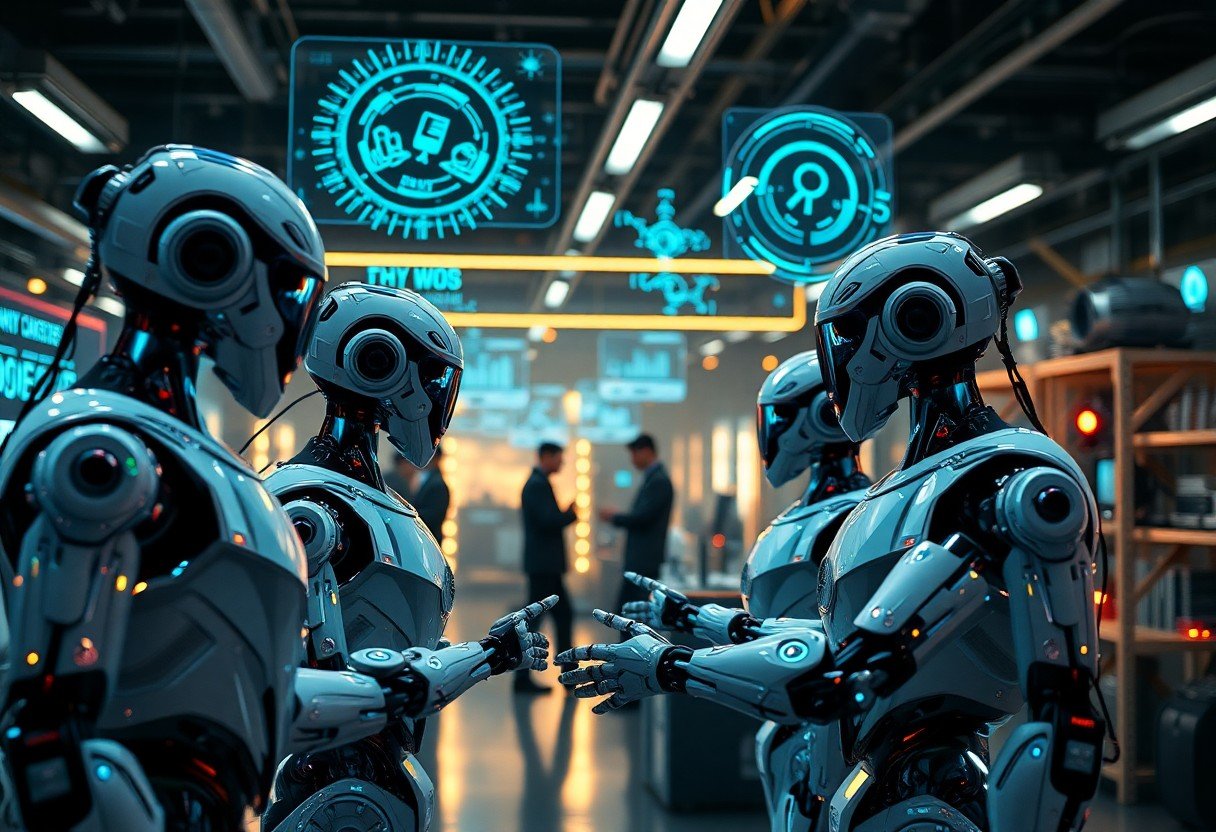Innovation in technology is rapidly evolving, and artificial intelligence (AI) stands at the forefront of this transformation. As you research into the world of AI, you will discover its immense potential to enhance productivity and streamline processes across various industries. However, it also presents ethical dilemmas and security risks that you must navigate. Understanding AI not only prepares you for the exciting opportunities it brings but also equips you to address its challenges effectively. Join us as we explore the fundamental aspects of AI and its significance in shaping future innovations.
1. AI drives efficiency across various industries and sectors.
2. Enhanced data analysis enables informed decision-making processes.
3. Machine learning fosters continuous improvement and adaptation capabilities.
4. Natural language processing transforms human-computer interactions significantly.
5. Ethical considerations are vital for responsible AI deployment.
6. Collaboration between AI and humans unlocks creative potential.
The Foundations of Artificial Intelligence
Definition and Overview
About artificial intelligence (AI) is a branch of computer science that aims to create machines capable of performing tasks that typically require human intelligence. These tasks include problem-solving, learning, and understanding natural language. AI systems range from simple algorithms that can perform specific tasks to more complex systems that can adapt and learn from their experiences. By comprehending the concept of AI, you can appreciate its significance in various applications, from virtual assistants to autonomous vehicles.
Historical Context and Evolution
After the inception of AI in the mid-20th century, the field has undergone substantial transformations. Initially, researchers focused on rule-based systems and symbolic AI, where specific rules dictated a machine’s behavior. However, the limitations of these systems led to the exploration of machine learning, enabling computers to learn from data. Over the years, significant advances in computing power and access to large datasets have paved the way for breakthroughs in deep learning and neural networks, propelling AI into new realms of capability and application.
Another significant evolution in AI occurred with the introduction of reinforcement learning, which allows machines to learn through trial and error, much like humans do. This method has produced remarkable results in fields such as game playing and robotics. You should also be aware that the rise of AI has sparked debates about its ethical implications and the need for regulations, illustrating both its positive potential in improving quality of life and the risks associated with its misuse. Understanding this historical context helps you grasp the trajectory of AI’s development and the importance of responsible innovation in shaping its future.

Key Technologies Driving AI
Assuming you are exploring the capabilities of Artificial Intelligence, it is imperative to know the key technologies that are propelling this field forward. Among these technologies, Machine Learning and Natural Language Processing stand out as foundational components. Understanding these technologies can significantly enhance your grasp on how AI is shaping future innovations. For a deeper insight, you may refer to this guide on Understanding AI Technology.
Machine Learning
Machine Learning enables systems to learn from data, modifying their processes without being explicitly programmed. This technology allows algorithms to improve over time by identifying patterns and making predictions based on the input data you provide. By leveraging enormous datasets, machine learning algorithms can enhance everything from image recognition to price forecasting, increasing the efficiency and accuracy of various applications you may encounter in daily life.
Natural Language Processing
Learning how to communicate effectively with machines is becoming increasingly important, and that’s where Natural Language Processing (NLP) comes into play. NLP empowers computers to understand, interpret, and generate human language in a valuable way, bridging the gap between human communication and computer understanding. This means that systems can respond to your inquiries, summarize texts, or even engage in complex dialogue with near-human levels of proficiency.
Language-based technologies have the potential to transform how you interact with devices and applications. They can streamline customer service operations through chatbots or assist in the analysis of vast amounts of textual data. Importantly, while NLP opens up numerous possibilities for innovation, it also poses challenges, such as ensuring data privacy and correctly interpreting context. Understanding both the advantages and the limitations of NLP is imperative for effectively integrating it into your operations or daily life.
Applications of AI in Various Industries
Once again, the transformative power of artificial intelligence is evident across multiple sectors, reshaping how businesses operate and how you interact with products and services. From manufacturing to entertainment, AI is enhancing efficiency, streamlining processes, and unlocking new opportunities. If you’re interested in delving deeper into this subject, check out What is Artificial Intelligence and How is it Shaping ….
Healthcare
Before discussing the applications of AI, it’s necessary to note that healthcare is experiencing a significant revolution thanks to these technologies. AI is being utilized in diagnostics, treatment plans, patient monitoring, and drug development. By analyzing vast amounts of data, AI algorithms can identify patterns that help healthcare professionals make informed decisions, leading to improved patient outcomes and personalized healthcare solutions.
Finance
On the financial front, AI is reshaping risk assessment, fraud detection, and customer service solutions. Financial institutions use sophisticated AI models to analyze market trends and perform predictive analytics, enabling you to make informed investment decisions. Additionally, chatbots and virtual assistants powered by AI are enhancing customer experiences by providing instant support and resolving inquiries more efficiently than traditional methods.
This progress has brought about both positive and negative implications. On one hand, AI’s ability to process and analyze data at an unprecedented scale leads to enhanced operational efficiency and better financial decision-making. On the other hand, challenges arise, such as the threat of biased algorithms that can impact your financial opportunities, along with the potential for data breaches that pose risks to your personal and financial information. Staying informed about these developments is necessary for navigating the evolving landscape of finance.
The Impact of AI on Society
To grasp the profound changes brought about by artificial intelligence, you must consider its multifaceted impact on society. AI is transforming various sectors, reshaping how you work, communicate, and engage with everyday tasks. From intelligent virtual assistants that streamline your day-to-day activities to complex algorithms helping researchers uncover groundbreaking insights, AI technologies are becoming integral to your life. However, with these advancements come both opportunities and challenges that demand your attention.
To fully appreciate the societal consequences, it’s crucial to recognize how AI influences economic landscapes, workplace dynamics, and even interpersonal relationships. As AI systems continue to evolve, they will redefine the boundaries of what is possible, prompting discussions about workforce transitions, the digital divide, and the role of humans in an increasingly automated world.
Economic Implications
By integrating AI into your work processes, there is potential for significant productivity gains, which may lead to economic growth. Businesses are investing heavily in automation and machine learning technologies, allowing them to optimize operations and reduce costs. However, while you may benefit from increased efficiency, there is a persistent concern about job displacement. The automation of routine tasks could result in a workforce struggling to adapt, making it imperative for you to consider lifelong learning and upskilling to remain competitive in the evolving job market.
By recognizing the uneven access to AI technologies, you come to understand that the economic implications extend beyond immediate productivity improvements. Companies that can leverage these systems effectively might gain substantial market advantages, potentially exacerbating income inequalities. Addressing these disparities is crucial; hence, it’s vital for policymakers and industries to implement fair practices that ensure everyone can benefit from AI advancements.
Ethical Considerations
Behind the technological marvels of AI lies a complex landscape of ethical dilemmas that you must navigate. As algorithms make decisions that can impact your life—ranging from credit scoring and hiring processes to law enforcement actions—the potential for bias and discrimination arises. If AI systems are trained on flawed data, their outputs can perpetuate societal inequalities and unfair treatment. Thus, if you’re involved in AI development or deployment, you should advocate for fairness and transparency.
With the growing interconnectedness of AI technologies, there are implications that extend to privacy, security, and accountability. You must question who is responsible if an AI system causes harm or makes a faulty decision. The rapid development of autonomous systems raises significant concerns about safety and human oversight. As you engage with AI, it becomes crucial to address these challenges proactively, ensuring that your approach balances the promise of innovation with the protection of individual rights and societal well-being.
Future Trends in Artificial Intelligence
Keep in mind that the future of artificial intelligence is filled with promise and potential, driven by innovations that are shaping how we interact with technology. Trends such as advancements in natural language processing and machine learning algorithms are already allowing businesses to create more personalized experiences for their customers. You can expect to see significant breakthroughs in AI-powered tools that enhance creativity, from generating unique content to designing new products. As these innovations continue to evolve, they will play a pivotal role in improving efficiency and effectiveness across various industries.
Innovations on the Horizon
Trends indicate that AI will soon be at the heart of a myriad of innovations, including autonomous systems that revolutionize transport and logistics. By leveraging this technology, you could find yourself in a world where self-driving vehicles, smart drones, and automated delivery systems become a common part of daily life. These advancements can significantly reduce the time and cost associated with transport logistics, while also promoting sustainability through improved resource management.
Integration with Emerging Technologies
Horizon scanning reveals that the integration of artificial intelligence with emerging technologies, such as the Internet of Things (IoT) and blockchain, is on the rise. This fusion can lead to enhanced data analytics and increased operational transparency. You might witness AI-driven IoT devices that not only communicate seamlessly but also learn from your habits to provide tailored solutions that improve your quality of life. In tandem with blockchain, this integration can ensure that the data generated is secure, making it trustworthy for businesses and consumers alike.
Emerging technologies present a unique opportunity for AI to elevate your experiences and business capabilities. As these technologies converge, you may find efficient AI solutions that process vast amounts of data in real-time, allowing for predictive analytics that can preemptively address issues before they escalate. The synergy between AI and emerging technologies is set to unlock new possibilities, transforming everything from patient care in healthcare to energy consumption in smart cities. As these trends gain traction, your ability to harness the power of AI will influence not just your individual success but also the broader landscape of innovation.
Challenges Facing AI Development
Despite the incredible potential of artificial intelligence to revolutionize various sectors, there are significant challenges that impede its development. These challenges range from technical limitations to ethical concerns, posing barriers that require careful navigation. As you explore the world of AI, understanding these obstacles can help you appreciate the complexities involved and the importance of overcoming them for further innovations.
Technical and Logistical Challenges
Along the journey of AI development, you will encounter a variety of technical and logistical challenges that can hinder progress. Creating sophisticated algorithms that can learn and adapt is a monumental task, often requiring vast amounts of data and computing power. Additionally, you might face issues related to data quality, as insufficient or biased data can lead to inaccurate models that produce unreliable results, potentially resulting in lost opportunities or misinformed decisions.
Moreover, logistical challenges arise in the need for collaboration across different disciplines and expertise. Building effective AI systems typically requires input from computer scientists, domain experts, and even legal advisors. As you engage with AI projects, it’s important to foster interdisciplinary teamwork to address these gaps and streamline development processes.
Regulatory and Ethical Challenges
Beside the technical hurdles, AI development is confronted with significant regulatory and ethical challenges that you must navigate carefully. As governments and organizations begin to recognize the implications of deploying AI technologies, they are establishing frameworks to ensure safety and compliance. These regulations aim to protect individuals and society at large, ensuring your creations do not perpetuate biases or result in harmful consequences.
Hence, addressing these regulatory and ethical challenges is paramount to sustaining trust in AI systems. You must prioritize transparency, accountability, and fairness in your AI initiatives to avoid potential pitfalls such as privacy violations or discrimination. Furthermore, establishing ethical guidelines and promoting responsible AI practices will not only foster public confidence but also establish a robust foundation for future innovations, ensuring that the benefits of AI are distributed equitably across society. The development of clear ethical frameworks can also enhance collaboration between researchers, policymakers, and industry stakeholders, paving the way for advancements that align with the collective good.
Conclusion
Drawing together the insights gained from this exploration of artificial intelligence, it becomes evident that understanding AI is necessary for anyone looking to engage with the innovations shaping our future. You are now equipped to recognize how AI technologies can impact various sectors, providing both opportunities and challenges. Embracing this knowledge will enable you to navigate the rapidly evolving landscape, empowering your decision-making processes and fostering your ability to leverage AI in both personal and professional realms.
As you move forward, consider how your interaction with AI can not only enhance your current capabilities but also inspire innovation within your community and industry. The more you learn about artificial intelligence, the better prepared you will be to engage with this transformative technology. Your awareness of AI will not only enrich your own endeavors but also contribute to a collective understanding of its potential, ultimately shaping a brighter, more efficient future for everyone.









